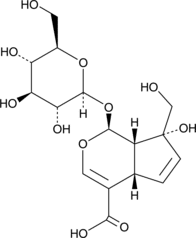Territorial Availability: Available through Bertin Technologies only in France
- Synonyms
- (1S,4aS,7R,7aS)-1-(?-D-glucopyranosyloxy)-1,4a,7,7a-tetrahydro-7-hydroxy-7-(hydroxymethyl)-cyclopenta[c]pyran-4-carboxylic acid
- Correlated keywords
- 1365-63-5 27120-79-2 31018-71-0 98845-47-7 741212-56-6 NSC291303 NSC88926 Morindae Morinda BM-EPC BMEPCs MMP3 MMP13 NF?B COX2 i-NOS TNF? IL1? interleukin
- Product Overview:
Monotropein is an iridoid glycoside originally isolated from M. officinalis roots and has diverse biological activities.{46362,46363,46364,46365,46366} It increases cell viability and migration of bone marrow-derived endothelial progenitor cells (BM-EPCs) when used at concentrations ranging from 0.1 to 1,000 ?M.{46362} Monotropein inhibits apoptosis and reduces levels of matrix metalloproteinase-3 (MMP-3) and MMP-13 in chondrocytes.{46363} It inhibits LPS-induced nuclear translocation of NF-?B and reduces COX-2, inducible nitric oxide synthase (iNOS), TNF-?, and IL-1? mRNA expression in RAW 264.7 cells.{46364} Monotropein (100 and 200 mg/kg) reduces colonic myeloperoxidase (MPO) activity, COX-2 and iNOS mRNA expression, and disease severity in a mouse model of ulcerative colitis induced by dextran sulfate sodium (DSS; Item No. 23250). It increases bone mineral content, bone mineral density, and improves bone microstructure in ovariectomized mice when administered at doses of 40 or 80 mg/kg.{46365} Monotropein (20 and 30 mg/kg) reduces acetic acid-induced writhing in mice and carrageenan-induced paw edema in rats.{46366} It also decreases macrophage infiltration and wound healing time and increases blood vessel formation in a rat model of wound healing.{46362}
Cayman Chemical’s mission is to help make research possible by supplying scientists worldwide with the basic research tools necessary for advancing human and animal health. Our utmost commitment to healthcare researchers is to offer the highest quality products with an affordable pricing policy.
Our scientists are experts in the synthesis, purification, and characterization of biochemicals ranging from small drug-like heterocycles to complex biolipids, fatty acids, and many others. We are also highly skilled in all aspects of assay and antibody development, protein expression, crystallization, and structure determination.
Over the past thirty years, Cayman developed a deep knowledge base in lipid biochemistry, including research involving the arachidonic acid cascade, inositol phosphates, and cannabinoids. This knowledge enabled the production of reagents of exceptional quality for cancer, oxidative injury, epigenetics, neuroscience, inflammation, metabolism, and many additional lines of research.
Our organic and analytical chemists specialize in the rapid development of manufacturing processes and analytical methods to carry out clinical and commercial GMP-API production. Pre-clinical drug discovery efforts are currently underway in the areas of bone restoration and repair, muscular dystrophy, oncology, and inflammation. A separate group of Ph.D.-level scientists are dedicated to offering Hit-to-Lead Discovery and Profiling Services for epigenetic targets. Our knowledgeable chemists can be contracted to perform complete sample analysis for analytes measured by the majority of our assays. We also offer a wide range of analytical services using LC-MS/MS, HPLC, GC, and many other techniques.
Accreditations
ISO/IEC 17025:2005
ISO Guide 34:2009
Cayman is a leader in the field of emerging drugs of abuse, providing high-purity Schedule I-V Controlled Substances to federally-licensed laboratories and qualified academic research institutions for forensic analyses. We are certified by ACLASS Accreditation Services with dual accreditation to ISO/IEC 17025:2005 and ISO Guide 34:2009.





